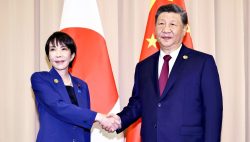12:45 JST, August 14, 2023
Efforts by the international shipping sector are vital to reducing greenhouse gas emissions. Japan, which is highly dependent on trade, needs to take the lead in global discussions on this issue and contribute its technological expertise.
The International Maritime Organization (IMO), a specialized agency of the United Nations, has set a new goal for international shipping to reach net-zero greenhouse gas emissions by around 2050.
The initial target was that emissions “should be reduced by at least 50% by 2050 compared to 2008.” The new goal is a significant increase.
Shipping accounts for 90% of global trade. The amount of greenhouse gas emissions from international shipping is equivalent to that of Germany. Emissions are expected to increase in the future as trade volume expands.
As an island nation, Japan has a large responsibility to play in decarbonizing its shipping industry, as almost 100% of its trade volume is transported by sea. Japan led the way in raising the goal this time, and all 175 IMO members agreed. Japan’s leadership is commendable.
In international shipping, ship operators, shipowners and ships are often registered in different countries.
This makes it difficult to count greenhouse gas emissions from ships on a country-by-country basis, hindering progress in reducing emissions because ships’ output is not included in the emissions results for each country.
The IMO will hold discussions among its members from now on, and will reportedly compile specific measures to achieve the target by the autumn of 2025.
For the time being, it is assumed that fuel will shift from heavy oil, which emits a large amount of carbon dioxide (CO2), to liquefied natural gas (LNG). But in the future, “zero-emission ships” that use such fuels as hydrogen and ammonia, which emit no CO2, will become essential.
In Japan, the government has decided to provide ¥35 billion over 10 years to support the development of zero-emission ships, and shipbuilding and shipping companies are aiming for test operations around 2026 to 2027.
However, ammonia and hydrogen are currently more expensive than heavy oil, and that will lead to higher costs for international shipping.
Japan has proposed the establishment of a mechanism to charge ships that use fossil fuels such as heavy oil, to cover the fuel costs of zero-emission ships. Effective measures must be taken to promote the introduction of such a mechanism while gaining the understanding of countries around the world.
It is important to speed up the development of zero-emission ships, in which Japan is considered to have a technological advantage, to strengthen the competitiveness of its shipbuilding industry.
Since ammonia and hydrogen are also used for power generation and other purposes, the establishment of a system to stably procure large quantities is also an important task. Japan must take the lead in developing an international supply chain.
(From The Yomiuri Shimbun, Aug. 13, 2023)
Top Articles in Editorial & Columns
-

Myanmar Will Continue Under Military Rule Even After Election, Ex-Ambassador Maruyama Says in Exclusive Interview
-

40 Million Foreign Visitors to Japan: Urgent Measures Should Be Implemented to Tackle Overtourism
-

Expansion of New NISA: Devise Ways to Build up Household Assets
-

China Criticizes Sanae Takaichi, but China Itself Is to Blame for Worsening Relations with Japan
-

Withdrawal from International Organizations: U.S. Makes High-handed Move that Undermines Multilateral Cooperation
JN ACCESS RANKING
-

Univ. in Japan, Tokyo-Based Startup to Develop Satellite for Disaster Prevention Measures, Bears
-

JAL, ANA Cancel Flights During 3-day Holiday Weekend due to Blizzard
-

China Confirmed to Be Operating Drilling Vessel Near Japan-China Median Line
-

China Eyes Rare Earth Foothold in Malaysia to Maintain Dominance, Counter Japan, U.S.
-

Japan Institute to Use Domestic Commercial Optical Lattice Clock to Set Japan Standard Time



















